及物动词后接动词不定式和动名词作宾语小结
动名词小结

动名词小结动名词(gerund)是一种特殊的名词形式,它由动词的现在分词形式(-ing 结尾)构成,表示动作或状态。
动名词可以在句子中扮演主语、宾语、表语、定语和状语的角色。
下面是动名词的用法和注意事项的小结。
一、动名词作主语:1. 动名词作主语通常表达一种习惯性、永久性的动作或真理。
例如:Swimming is good for your health.(游泳对身体好。
)2. 注意不仅可用于单数动词作主语,也可用于复数动词作主语。
二、动名词作宾语:1. 动名词可以作及物动词的宾语,并且与及物动词连用,形成动名词短语。
例如:I enjoy swimming in the sea.(我喜欢在海里游泳。
)2. 一些常见的及物动词后面通常接动名词作宾语,例如:like, love, hate, enjoy, avoid, admit, finish, consider, appreciate, suggest 等。
例如:I hate doing housework.(我讨厌做家务。
)三、动名词作表语:1. 动名词可以作连系动词的表语,常用动词有be, feel, look, sound, appear, seem等。
例如:The baby sounds happy.(这个宝宝听起来很开心。
)四、动名词作定语:1. 动名词可以作名词的前置修饰语,用来修饰名词或名词短语。
例如:I saw a man(who was) running towards me.(我看见一个朝我跑来的人。
)五、动名词作状语:1. 动名词常用于表示目的、原因、结果、时间、方式、条件、让步和方式等状语的作用。
例如:He went to the park for playing football.(他去公园踢足球。
)2. 动名词在短语中作状语时,通常放在谓语动词之后。
例如:She is good at playing the piano.(她擅长弹钢琴。
insist的用法小结

千里之行,始于足下。
insist的用法小结Insist是一个多义词,可以用作及物动词和不及物动词。
作为及物动词,insist接受宾语,可以跟宾语从句或者动名词作宾语,表示强烈要求或坚决主张。
作为不及物动词,insist没有宾语,常常与on, upon等介词连用,表示坚持或坚决主张。
以下是insist的用法小结:1. Insist + 宾语从句Insist可以紧跟宾语从句,表示要求或主张某事必须发生或某事一定是真的。
例如:- She insisted that I apologize to her.(她坚持要求我向她道歉。
)- He insisted that he was innocent.(他坚持他是无辜的。
)- They insisted that the meeting be cancelled.(他们坚持取消会议。
)2. Insist + 动名词Insist也可以跟动名词作宾语,表示要求或主张继续进行某项活动或状态。
例如:- He insisted on going to the party.(他坚持要去参加派对。
)- She insisted on keeping the dog.(她坚持养这只狗。
)- They insisted on finishing the project by the end of the week.(他们坚持在本周末前完成这个项目。
)3. Insist + on/upon + 名词/动名词Insist还可以与介词on或upon连用,表示坚持要求做某事或坚决主张某事。
例如:- He insisted on coming with us.(他坚持要和我们一起去。
)- She insisted on paying for the dinner.(她坚持付餐费。
)第1页/共3页锲而不舍,金石可镂。
- I insisted upon having a written agreement.(我坚决主张要有一份书面协议。
动词后接动词不定式/动名词作宾语用法小结

动词后接动词不定式/动名词作宾语用法小结动词是英语中最活跃的词性之一,其主要作用是在句中作谓语。
在谓语动词后接动词作宾语时,主要分为两种情况:Ⅰ动词加动词不定式能以不定式做宾语的动词很多,常见的有:want,hope,wonder,wish,agree,try,manager,offer,decide,fail,refuse,ask,pretend,intend,attempt,teach,discuss等。
例如:I have learned to drive the car.They refused to accept my suggestion.He promised to come.Ⅱ动词加动名词在enjoy, appreciate, admit, consider, mind, avoid., miss, can’t help, deny, practise, allow, finish, imagine, forbid, suggest等这些动词之后要求用动名词作宾语。
例如:Have you finished repairing your car?She suggested spending another week in the country.Do you feel like taking a walk.通常要后接动名词作宾语的动词英语中有些动词后接另一个动词作宾语时,通常要用不定式,不用动名词,这类动词主要admit(承认), advise(建议), allow(允许), appreciate(感激), avoid(避免), consider(考虑), delay(推迟), discuss(讨论), dislike(不喜欢), enjoy(喜爱), escape(逃脱), excuse(原谅), fancy(没想到), finish(完成), forbid(禁止), forgive(原谅), give up(放弃), imagine(想像), keep(保持), mention(提及), mind(介意), miss(没赶上), pardon(原谅), permit(允许), practise(练习), prevent(阻止), put off(推迟), report(报告), resist(忍住), risk(冒险), stop(停止), suggest(建议), understand(理解)等。
动词不定式和动名词作主语和宾语的用法

动词不定式和动名词作主语和宾语的用法动词不定式和动名词都可以作为句子的主语和宾语。
它们通常可以表示某个动作或状态,并且在句子中起着名词的作用。
下面将分别介绍动词不定式和动名词作主语和宾语的用法。
1. 动词不定式作主语和宾语动词不定式是由动词原形加上"to"构成的结构,常常可以作为主语和宾语。
动词不定式作主语时,常常表示一个具体的行为或动作,可以引出句子的主要内容。
例如:"To travel around the world" is my dream.("环游世界"是我的梦想)动词不定式作主语时,常常放在句子的开头或者结尾,有时也可能会出现在句子的中间。
动词不定式还可以表示时间、原因、目的、结果等。
例如:To finish the work early is important.(早点完成工作是很重要的)I went to the shop to buy some food.(我去商店是为了买一些食物)动词不定式也可以作为句子的宾语。
在这种情况下,动词不定式通常紧跟在及物动词后面,充当动词的宾语。
例如:She likes to listen to music.(她喜欢听音乐)常见的及物动词后跟不定式的有:like, want, hope, expect, need, plan, promise, decide等。
例如:I want to visit London next year.(我想明年去伦敦)She decided to study abroad.(她决定出国留学)He promised to help me with my homework.(他答应帮我做作业)。
及物动词后接动词不定式和动名词作宾语小结

及物动词后接动词不定式和动名词作宾语小结动词是英语中最活跃的词性之一,其主要作用是在句中作谓语。
谓语动词后接动词作宾语时, 主要分为两种情况:Ⅰ动词加动词不定式能以不定式做宾语的动词很多, 常见的有:want , hope ,wonder , wish , agree ,try , manager , offer , decide , fail ,refuse , ask , pretend , intend , attempt ,teach , discuss 等。
例如: 1. I have learned to drive the car.2. They refused to accept my suggestion.3. He promised to come.Ⅱ动词加动名词在enjoy, appreciate, admit, consider, mind, avoid., miss, can’t help, de ny,practise, allow, finish, imagine, forbid, suggest 等这些动词之后要求用动名词作宾语。
例如:1. Have you finished repairing your car?2. She suggested spending another week in the country.3. Do you feel like taking a walk.需要我们注意的是, 有些动词既可用动词不定式也可用动名词作宾语。
这两种结构在意义上有时差别不大, 有时差别较明显。
下面分别说一下这两种情况:这两种情况在意义上差别不大的词有:love, like, hate, prefer, begin,start, continue,等。
例如:1. Do you like playing(to play) chess?2. When did you begin learning(to learn) French?随着语言的发展, 这些区别也在逐渐缩小,但需要注意的是:在like, love, prefer 等动词后, 若表示经常性的抽象的动作,多用动名词作宾语;若指特定的或具体的行动, 则用不定式更多一些。
初中英语动词不定式和动名词做宾语用法总结

初中英语动词不定式和动名词做宾语用法总结-CAL-FENGHAI.-(YICAI)-Company One1动词不定式和动名词做宾语用法总结一、下列动词后跟 to do 作宾语补足语advise sb to do sth 建议某人做某事 get sb to do sth 使某人做某事allow sb to do sth 允许某人做某事 remind sb to do sth 提醒某人做某事ask sb to do sth 请求某人做某事 invite sb to do sth 邀请某人做某事request sb to do sth 要求某人做某事 intend sb to do sth 打算要某人做某事prefer sb to do sth 宁愿某人做某事 teach sb to do sth 教某人做某事tell sb to do sth 告诉某人做某事 train sb to do sth 训练某人做某事like sb to do sth 喜欢某人做某事 encourage sb to do sth 鼓励某人做某事mean sb to do sth 想要某人做某事 expect sb to do sth 期待某人做某事order sb to do sth 命令某人做某事 want sb to do sth 想要某人做某事permit sb to do sth 允许某人做某事 warn sb to do sth 警告某人做某事force sb to do sth 强迫某人做某事 wish sb to do sth 希望某人做某事use sth to do sth 使用某事做某事 forbid sb to do sth 禁止某人做某事command sb to do sth 命令某人做某事 help sb(to) do sth 帮助某人做某事 beg sb to do sth 乞求某人做某事 cause sb to do sth 引起/导致某人做某事persuade sb to do sth 劝说某人做某事 trouble sb to do sth 麻烦某人做某事hate sb to do sth 讨厌某人做某事 drive sb to do sth 驱使某人做某事二、下列动词后跟 to do 做宾语help to do sth 帮助做某事 hope to do sth 希望做某事ask to do sth 要求做某事 refuse to do sth 拒绝做某事decide to do sth 决定做某事 promise to do sth 承诺做某事wish to do sth 希望做某事 pretend to do sth 假装做某事expect to do sth 期待做某事 arrange to do sth 安排做某事learn to do sth 学习做某事 plan to do sth 计划/打算做某事demand to do sth 命令做某事 dare to do sth 胆敢做某事manege to do sth 设法完成某事 agree to do sth 同意做某事prepare to do sth 准备做某事 fail to do sth 未能做成某事determine to do sth 下定决心做某事 offer to do sth 主动提出做某事choose to do sth 选择做某事 desire to do sth 愿望做某事elect to do sth 选举做某事 would like to do sth 想要做某事afford to do sth 负担得起做某事 used to do sth 过去常常做某事beg to do sth 乞求做某事 fear to do sth 害怕做某事be afraid to do sth 害怕做某事 make an effort to do sth 尽力做某事be supposed to do sth 应该做某事 = be expected to do sth 被期待做某事make an effort to do sth 尽力做某事 like/love to do sth 喜欢做某事be ready to do sth 准备做某事;愿意做某事be sure to do sth 确保做某事 be willing to do sth 愿意做某事start/begin to do sth 开始做某事 can’t wait to do sth 迫不及待做某事happen to do sth 碰巧做某事三、下列动词或动词短语后跟doing做宾语四、下列动词后跟doing和to do 意思不同1.Remember to do sth 记得去做某事Remember doing sth 记得做过某事2.Forget to do sth 忘记去做某事Forget doing sth 忘记做过某事3.Regret to do sth 很遗憾要做某事(对现在要做的事)Regret doing sth 后悔做了某事(事情已发生)4.Stop to do sth 停下来去做另一件事Stop doing sth 停止做某事5.Mean to do sth 打算,想要做某事Mean doing sth 意思是,意味着6.Try to do sth 设法做某事,尽力做某事Try doing sth 尝试做某事7.Go on to do sth 接着做不同的事与continue 的用法相同 Go on doing sth 接着做同一件事8.Can’t help doing sth 情不自禁做某事Can’t help to do sth 不能帮助做某事。
动词不定式与动名词作宾语的区别

动词不定式与动名词作宾语的区别英语中有的及物动词只能跟动名词作宾语;有的及物动词只能跟动词不定式作宾语;但也有及物动词的宾语既是动名词又是动词不定式。
区别在于:一、在want,decide,promise,refuse,agree,wish,hope,expect等及物动词后面的宾语只能是动词不定式,不是动名词。
如:1.I want to have a talk with her.我想跟她谈谈。
2.Our teacher decided to stay with us.老师决定留下来与我们在一起。
3.My English teacher promised to lend some books to me.我的英语老师答应借给我一些书。
4.My mother refused to go there with us.我妈妈拒绝和我们一起去那里。
二、在一些动词后要求只跟动名词作宾语:1、在finish,enjoy,mind,suggest,practise,admit承认advise建议allow允许appreciate 感激,avoid避免,consider考虑,delay推迟,deny 否认,discuss 讨论,dislike 不喜欢,enjoy 喜爱,escape 逃脱,excuse 原谅,fancy 设想,finish 完成,forbid 禁止,forgive 原谅,give up 放弃,imagine 想像,keep 保持,mention 提及,mind 介意 miss 没赶上,pardon 原谅,permit 允许,practise练习,prevent 阻止,put off 推迟,report 报告,risk 冒险,stop 停止,suggest 建议,understand 理解。
1.I advise waiting a few more days. 我建议再等几天。
2.I admit breaking the window. 我承认窗子是我打破的。
非谓语动词作宾语知识点
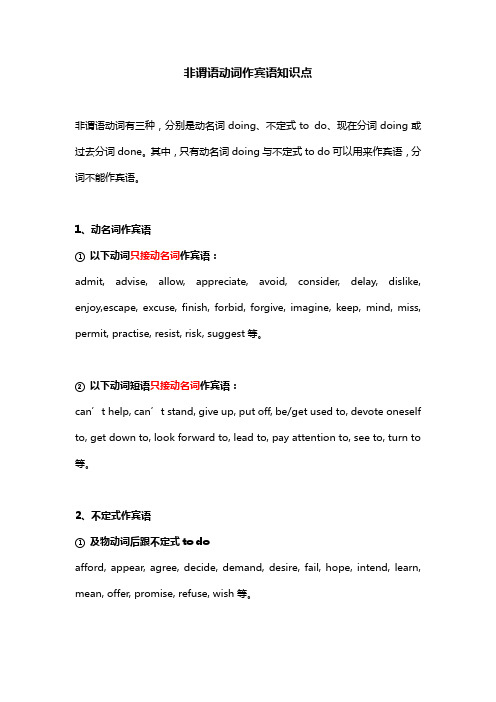
非谓语动词作宾语知识点非谓语动词有三种,分别是动名词doing、不定式to do、现在分词doing或过去分词done。
其中,只有动名词doing与不定式to do可以用来作宾语,分词不能作宾语。
1、动名词作宾语①以下动词只接动名词作宾语:admit, advise, allow, appreciate, avoid, consider, delay, dislike, enjoy,escape, excuse, finish, forbid, forgive, imagine, keep, mind, miss, permit, practise, resist, risk, suggest等。
②以下动词短语只接动名词作宾语:can’t help, can’t stand, give up, put off, be/get used to, devote oneself to, get down to, look forward to, lead to, pay attention to, see to, turn to 等。
2、不定式作宾语①及物动词后跟不定式to doafford, appear, agree, decide, demand, desire, fail, hope, intend, learn, mean, offer, promise, refuse, wish等。
②动词+疑问代(副)词+不定式to do动词:advise, decide, forget, know, learn, remember, see, tell, think, teach, wonder, discover, understand, guess, explain等。
疑问词:what, when, which, where, how,whether。
e.g. He will tell you how to deal with it.特别说明:不定式作宾语时,有时会使用it作形式宾语,然后把不定式放后面。
动词后接动名词和动词不定式

动词后接动名词和动词不定式某些动词其后既可以接动词不定式,也可以接动名词,但表示的意义不同.不定式一般表示动作尚未发生,而动名词表示动作已经发生于这个动词之前.类候动词有:forget/remember, stop/go on,regret,等等.Forget/remenber doing somthing:记得/忘记做过某事..........I forget turning off the light.我已以关了灯,但却忘了这事.Forget/remenber to do something: 记得/忘记将要做什么..........I remember to cook for you.我记得要给你做饭.stop/go on doing:停止/继续做正在做的事.......stop watching TV停止看电视stop/go on to do:停下来/继续做另外的事(表示目的).......stop to watch TV停下(现在正在做的事)来看电视Regret doing 悔恨做了某事,..........I regret telling you that.我后悔告诉了你那事Tegret to do 遗憾做某事.............I regret to tell you that we cannot to go.遗憾的告诉你我们不能去了有些动词既可接动名词作宾语,也可接不定式,但在语义上却有很大差别。
如:⑴chance to do 碰巧去做某事chance doing 冒险试一试做某事⑵forget to do 忘记要去做某事forget doing 忘记曾做过某事⑶go on to do 接着又做另一件事go on doing 继续做同一件事⑷remember to do 记得要去做某事remember doing 记得曾做过某事⑸stop to do 停下来去做某事stop doing 停止做某事⑹try to do 努力做某事try doing 试一试做某事⑺regret to do 对将要做的事表示遗憾regret doing 对做过的事表示遗憾⑻mean to do 打算/想做某事mean doing 意味着/意思是做某事动词接动名词还是不定式一个及物动词后接另一动词作宾语时,有时只能用不定式,有时只能用动名词,有时用不定式或动名词均可且含义相同,有时用不定式或动名词均可但含义不同。
动词作宾语该用什么形式(一)

动词作宾语该用什么形式(一)一个及物动词后接另一动词作宾语时,有时只能用不定式,有时只能用动名词,有时用不定式或动名词均可且含义相同,有时用不定式或动名词均可但含义不同。
具体情况大致如下:一、习惯上只接动名词作宾语的动词admit 承认advise 建议allow 允许appreciate 感激avoid 避免consider 考虑delay 推迟discuss 讨论dislike 不喜欢enjoy 喜爱escape 逃脱excuse 原谅fancy 设想finish 完成forbid 禁止forgive 原谅give up 放弃imagine 想象keep 保持mention 提及mind 介意miss 没赶上pardon 原谅permit允许practise 练习prevent 阻止prohibit 禁止put off 推迟report 报告risk 冒险stop 停止suggest 建议I advise waiting a few more days. 我建议再等几天。
I admit breaking the window. 我承认窗户是我打破的。
Try to imagine being on the moon. 设法想象你是在月球上。
He tried to escape being punished. 他设法逃避惩罚。
You shouldn’t keep thinking about it. 你不该老想着这事。
Would you mind going with her? 你可否同她一起去?注:(1) 有的动词后接动名词作宾语时通常带有逻辑主语。
如:The rain prevented his coming. 下雨使他不能来。
(2) 有的动词(如advise, allow, forbid, permit等)后虽然不能直接跟不定式作宾语,但可接不定式作宾语补足语;而有些动词(如consider, understand, discuss)则可接“疑问词+不定式”作宾语。
初中英语知识点归纳动词的不定式和动名词用法总结
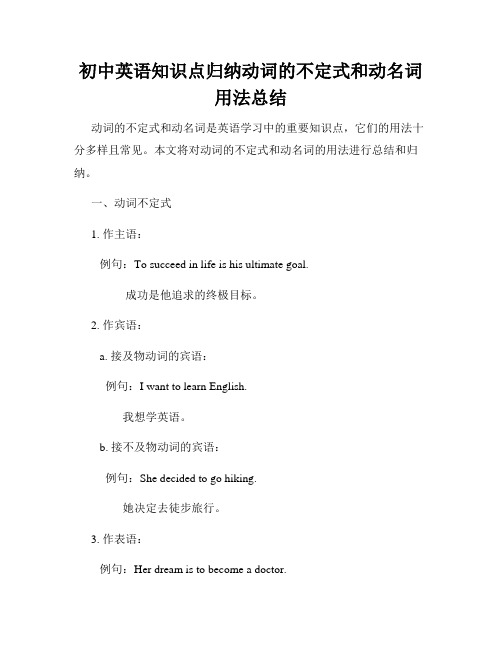
初中英语知识点归纳动词的不定式和动名词用法总结动词的不定式和动名词是英语学习中的重要知识点,它们的用法十分多样且常见。
本文将对动词的不定式和动名词的用法进行总结和归纳。
一、动词不定式1. 作主语:例句:To succeed in life is his ultimate goal.成功是他追求的终极目标。
2. 作宾语:a. 接及物动词的宾语:例句:I want to learn English.我想学英语。
b. 接不及物动词的宾语:例句:She decided to go hiking.她决定去徒步旅行。
3. 作表语:例句:Her dream is to become a doctor.她的梦想是成为一名医生。
4. 作补语:a. 表示命令、建议、请求等:例句:She told me to wait for her at the gate.她告诉我在门口等她。
b. 表示目的、目标等:例句:He went to the store to buy some groceries.他去商店买一些杂货。
5. 作定语:例句:We need a person to help us with the project.我们需要一个人来帮助我们完成这个项目。
6. 作状语:a. 表示目的、结果、原因等:例句:He studied hard to pass the exam.他努力学习为了通过考试。
b. 表示时间、条件等:例句:I woke up early to catch the bus.我早起为了赶公交车。
二、动名词1. 作主语:例句:Swimming is my favorite sport.游泳是我最喜欢的运动。
2. 作宾语:例句:I enjoy reading books in my free time.我喜欢在空闲时间读书。
3. 作表语:例句:Her hobby is dancing.她的爱好是跳舞。
4. 作补语:例句:His job is teaching English.他的工作是教英语。
高中英语非谓语动词用法小结
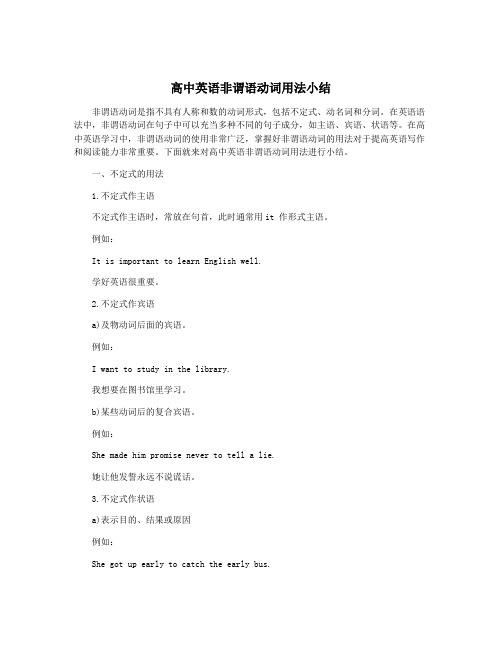
高中英语非谓语动词用法小结非谓语动词是指不具有人称和数的动词形式,包括不定式、动名词和分词。
在英语语法中,非谓语动词在句子中可以充当多种不同的句子成分,如主语、宾语、状语等。
在高中英语学习中,非谓语动词的使用非常广泛,掌握好非谓语动词的用法对于提高英语写作和阅读能力非常重要。
下面就来对高中英语非谓语动词用法进行小结。
一、不定式的用法1.不定式作主语不定式作主语时,常放在句首,此时通常用it 作形式主语。
例如:It is important to learn English well.学好英语很重要。
2.不定式作宾语a)及物动词后面的宾语。
例如:I want to study in the library.我想要在图书馆里学习。
b)某些动词后的复合宾语。
例如:She made him promise never to tell a lie.她让他发誓永远不说谎话。
3.不定式作状语a)表示目的、结果或原因例如:She got up early to catch the early bus.她早早起床是为了赶上早班车。
b)表示方式、条件等例如:People may use calculators to calculate.人们可以使用计算器来计算。
二、动名词的用法动名词可以作主语、宾语、表语或者定语,并且可以放在be 动词、实义动词和介词后面。
动名词也经常与情态动词、不定式和被动语态连用。
1.动名词作主语例如:Swimming is good for health.游泳对健康有益。
2.动名词作宾语动名词可以作及物动词的宾语,也可以作介词后面的宾语。
例如:I enjoy reading books.我喜欢读书。
4.动名词作定语例如:The girl sitting next to me is my best friend.坐在我旁边的那个女孩是我最好的朋友。
三、分词的用法分词包括现在分词和过去分词,它们可以作状语、定语、表语、主语、宾语等。
动词不定式和动名词作宾语

动词不定式和动名词作宾语动词不定式和动名词均可在及物动词后面作宾语,但在使用过程中应注意以下几点:一、依照惯用法,agree,choose,decide,hope,fail,wish,refuse,expect,manage,plan,intend, pretend, promise, offer, afford, demand和arrange等及物动词后面常接动词不定式作宾语。例如:What did they decide to do?他们决定干什么?I hope to be back soon.我希望早点回家。二、依照惯用法, finish, enjoy, mind, keep, miss, avoid, consider, imagine, practise, delay,escape, excuse, allow, suggest等及物动词后面常接动名词作宾语。例如:We canfinish buildingthe bridge before the end of nextmonth.我们可以在下个月底之前建好这座桥。Would you mind opening the window?请您开一下窗户,好吗?三、依照惯用法, prefer,hate, begin,start, continue, cease等及物动词后面跟动词不定式与跟动名词作宾语,意义上没有多大的差别。例如:After the teacher left the classroom, the students began to do/doing their homework.老师离开教室后,学生们开始做作业。They continued to read/reading English.他们继续读英语。但在下列情况下,宜用动词不定式作宾语,而不用动名词。1. like, love, prefer, hate等与would或should连用时。例如:I’d prefer to stay home to watch TV.我宁可呆在家里看电视。2. begin, start, continue等本身用的是进行体时。例如:She was starting to do her homework.她开始做作业。3. begin, start, cease, continue的主语是物而不是人时。例如:It began/started to rain.天开始下雨。The ice ceased to melt(融化) in winter.冬季冰不再融化。4. begin等及物动词后接know, understand, realize等表示心理状态的动词。例如:They began to realize theimportance oflearning aforeignlanguage well.他们开始意识到学好一门外语的重要性。四、下列动词后面既可接动词不定式作宾语,也可接动名词作宾语,但两种结构的意义有区别:1. rember,forget, regret等后接动词不定式作宾语时,说明动词不定式表示的动作发生在后, rember等动词表示的动作发生在前;这些动词后接动名词作宾语时,说明动名词表示的动作发生在前, rember等动词表示的动作发生在后。试比较:Shetoldme togo andlock the door. She didn’t remberlocking the door after supper.她叫我去锁门,她不记得晚饭后锁过门了。Rember to turn off all the lights when you leave the classroom.你离开教室时,别忘记把所有的灯关掉。2. try, mean, can’t help,go on等动词后接动词不定式和动名词时,意义有明显的差别:1) try后面的动词不定式是作目的状语,tryto do sth意为“尽力做某事”; try 后面的动名词是作宾语, try doing sth意为“尝试做某事”。例如:He tried not to be late for the meeting.他争取开会不迟到。The soup is a little salty. Try adding some water to it.汤咸了点,加点水试试看。2)mean后面的动词不定式和动名词都是作宾语。meantodosth意为“打算(意图)做某事”; mean doing sth意为“意味着做某事”。例如:They didn’t mean to go an d help you.他们不打算去帮助你们。Hiswordsmeantgoingtohelpyouwithoutdelay.他的话意味着他将毫不迟疑地前去帮助你们。3) help后面的动词不定式和动名词都是作宾语。can’t help to do sth意为“不能帮忙做某事”; can’t help doing sth意为“禁不住去做某事,情不自禁地做某事”。例如:I’m sorry I can’t help to clean the room.对不起,我不能帮助打扫房间。They couldn’t helplaughingwhen theyheard the joke.听到这个笑话,他们不禁大笑起来。4) go on后面的动词不定式是作目的状语。go on to do sth意为“接下去做另一件事”;go on后面的动名词是作宾语。go on doing sth意为“继续做同一件事”。例如:They went on to do some exercises after reading the text.读完课文后,他们接着做练习。We went on doing our homework after he left.他走后我们继续做作业。五、need, want, require等动词后面跟动名词的主动形式和跟动词不定式的被动式,都表示被动意义。试比较:Your house needs repairing/to be repaired.你的房子需要维修。The problem requires solving/to be solved immediately.这个问题需要立即予以解决。六、stop之后的动名词为宾语, stop之后的动词不定式为目的状语。试比较:We stopped working.我们停止工作。We stopped to have a rest.我们停下来休息一下。When it began to rain, we stopped working to have a rest.天开始下雨,我们停止工作,休息一下。在英语中,某些动词后面只能跟动词不定式作直接宾语。
初中英语知识点归纳动词的不定式与动名词的用法

初中英语知识点归纳动词的不定式与动名词的用法动词的不定式与动名词是英语中常见的两种动词形式,它们在句子中有各自独特的用法。
本文将对初中英语中动词的不定式与动名词的用法进行归纳总结。
一、动词的不定式的用法1. 不定式作为主语不定式可以作为句子的主语,常用的句型有:- To study English is important.- To succeed needs hard work.- To learn a foreign language is challenging.2. 不定式作为宾语不定式可以作为及物动词的宾语,常用的动词有:- want, hope, plan, decide等。
例如:- She wants to go shopping.- They hope to win the game.- I plan to visit my grandparents next week.3. 不定式作为表语不定式也可以作为句子的表语,常用的句型有:- The best way to learn is to practice.- His dream is to become a doctor.- My goal is to travel around the world.4. 不定式作为状语不定式可以作为状语修饰动词、形容词或副词。
常用的句型有:- I woke up early to catch the train.- She was too tired to continue working.- He spoke slowly to make sure everyone understood.二、动名词的用法1. 动名词作为主语动名词可以作为句子的主语,常用的句型有:- Swimming is my favorite sport.- Reading books is a good way to relax.- Playing basketball requires teamwork.2. 动名词作为宾语动名词可以作为及物动词的宾语,常用的动词有:- enjoy, like, love, hate等。
动词不定式作宾语的用法总结-概述说明以及解释

动词不定式作宾语的用法总结-概述说明以及解释1.引言1.1 概述动词不定式是英语语法中重要的语法现象之一,它在句子中通常作为宾语出现。
本文将围绕动词不定式作为宾语的用法展开详细的讨论和总结。
动词不定式作为宾语的用法十分广泛,不仅可以用在及物动词后作宾语,还可以用在某些介词后、某些形容词后以及某些表达方式中。
引入动词不定式作为宾语的概念和定义是为了更好地理解其具体用法。
所谓动词不定式即是由动词原形加上to构成的非谓语形式。
它具有与实义动词相似的功能,可以独立充当动词的宾语,表达一种动作或状态。
在句子中,动词不定式通常紧跟在及物动词或介词后面,充当宾语的角色。
对于想要学习英语的学生来说,掌握动词不定式作为宾语的用法是至关重要的。
因为动词不定式相对简单且灵活,能够帮助我们表达自己的意思,并使句子更加丰富多样。
而本文的目的就是通过对动词不定式作为宾语的用法进行详细分析和总结,帮助读者更好地掌握和运用这一语法现象。
在接下来的正文部分,我们将分为两个主要的用法来阐述动词不定式作为宾语的具体应用。
首先,我们将介绍动词不定式作为宾语的基本概念和定义,以及它与其他非谓语动词之间的区别。
然后,我们将详细讨论动词不定式作为宾语的用法一和用法二,包括在及物动词后充当宾语、在介词后充当宾语、以及在形容词后充当宾语的情况。
最后的结论部分将对动词不定式作为宾语的用法进行总结,并提出对其使用的建议。
通过对动词不定式作为宾语的进一步研究展望,我们可以对该语法现象有更加深入和全面的理解。
通过掌握动词不定式作为宾语的用法,我们可以更加准确地表达自己的意思,使句子更加流利、自然。
希望本文能够给读者带来帮助,提升他们的英语写作和口语能力。
1.2文章结构文章结构部分的内容可以包括以下内容:文章结构是指整篇文章按照一定的逻辑顺序进行组织和展开的方式。
一个良好的文章结构可以使读者更好地理解和掌握文章的内容。
本文的结构可以分为以下几个部分:1. 引言:引言部分主要是对文章的主题进行介绍和概述。
动词后接V-ing和todo做宾语的各种情况分类总结

动词后接V-ing和todo做宾语的各种情况分类总结动词之后接非谓语动词to do或doing大致可以分四类,一,只接动词不定式to do;二,只接doing;三,既可以接to do也可以接doing 意义基本相同;四,既可以接to do也可以接doing意义截然不同。
这样记忆更方便。
一. 只接不定式的动词1. want to do sth. 想要做某事2. would like /love to do sth.想要做某事3. wish to do sth. 希望做某事4. help to do sth. 帮助做某事5. hope to do sth. 希望做某事6. learn to do sth. 学会做某事7. manage to do sth. 设法做成某事8. offer to do sth. 主动提出做某事9. plan to do sth. 计划做某事10. afford to do sth. 负担得起做某事(时间或金钱方面)11. agree to do sth. 做某事12. arrange to do sth.安排做某事13. ask to do sth. 要求做某事14. beg to do sth. 恳求做某事15. care to do sth. 愿意/喜欢做某事16. choose to do sth. 选择做某事17. decide to do sth. 决定做某事18. demand to do sth. 要求做某事19. determine to do sth. 决心做某事(常有被动式be determined to do sth.)20. expect to do sth. 等待做某事(常有被动式be expected to do sth.)21. fear to do sth. 惧怕做某事22. prepare to do sth. 预备做某事23. pretend to do sth. 伪装做某事(pretend to have done sth.假装做过某事/pretend to bedoing sth.假装正在做某事)24. promise to do sth. 答应做某事25. refuse to do sth. 拒绝做某事二. 只接动名词的动词1. practice doing sth. 练习做某事2. consider doing sth. 考虑做某事3. enjoy doing sth. 喜欢做某事4. finish doing sth. 完成做某事5. give up doing sth. 放弃做某事6. imagine doing sth. 想象做某事7. keep doing sth. 一直做某事8. put off doing sth. 推迟做某事9. risk doing sth. 冒险做事10. suggest doing sth. 建议做某事11. admit doing sth. 承认做某事12. advise doing sth. 建议做某事13. allow doing sth. 允许做某事14. appreciate doing sth. 感谢做某事15. avoid doing sth. 避免做某事16. delay doing sth. 拖延做某事17. deny doing sth. 否认做某事18. discuss doing sth. 讨论做某事19. dislike doing sth. 不喜欢做某事20. escape doing sth. 逃脱做某事21. excuse doing sth. 原谅做某事22. fancy doing sth. 想象/喜爱做某事23. forbid doing sth. 禁止做某事24. mention doing sth. 提及做某事25. mind doing sth. 介意做某事26. miss doing sth. 错过做某事27. permit doing sth. 允许做某事28. prohibit doing sth. 禁止/阻止做某事(=ban doing sth.)三.既可以接不定式也可以接动名词,意义基本相同1,begin doing sth.(开始做某事)begin to do sth.(开始做某事)2,start doing sth.(开始做某事)start to do sth.(开始做某事)3,like doing sth.(喜欢做某事)like to do sth.(喜欢做某事)4,dislike doing sth.(不喜欢做某事)dislike to do sth.(不喜欢做某事)四. 既可接不定式也可接动名词,意义截然不同1. remember to do sth. 记住要做某事(未做)remember doing sth. 记得做过某事(已做)2. forget to do sth. 忘记去做某事(未做)forget doing sth. 忘记做过某事(已做)3. regret to do sth. 遗憾要做某事(未做)regret doing sth. 后悔/抱歉做过某事(已做)4. try to do sth. 努力做某事try doing sth. 尝试做某事5. mean to do sth. 计划做某事mean doing sth. 意味着做某事6. can’t help to do sth. 不能帮助做某事can’t help doing sth. 情不自禁做某事7. go on to do sth. 继续做另一件事go on doing sth. 继续做同一件事8. stop to do sth. 停下来去做另一件事stop doing sth. 停下正在做的事情四,感官动词接动词原形do或现在分词V-ing做宾语补语,意义有别,前者表示动作结束,后者表示动作在进行中1. see sb. do sth. 看到某人做过了某事see sb.doing sth.看见某人正在做某事2. watch sb. do sth. 观看某人做了某事watch sb. doing dth.观看某人在做某事3. notice sb. do sth. 注意到某人做了某事notice sb. doing sth.注意到某人在做某事4. observe sb. do sth. 观察到某人做了某事observe sb. doing sth.观察某人在做某事5, hear sb. do sth. 听到某人做了某事hear sb. doing sth.听见某人在做某事6,feel sb. do sth.(感觉某人做过某事)feel sb. doing sth.(感觉某人正在做某事)五,表示“使或让”三个动词后接省略to的不定式一个动词接to do1. make sb. do sth. 使某人做某事2. let sb. do sth. 让某人做某事3. have sb. do sth. 使某人做某事4.get sb. to do sth.让某人做某事注意:以上感官动词用法灵活,它可以接省去to的不定式即动词原形做宾补也可以接现在分词和过去分词作宾补,但在表达的时间和语态上会有变化,我们以see为例来区分一下。
动名词与不定式的区别与运用
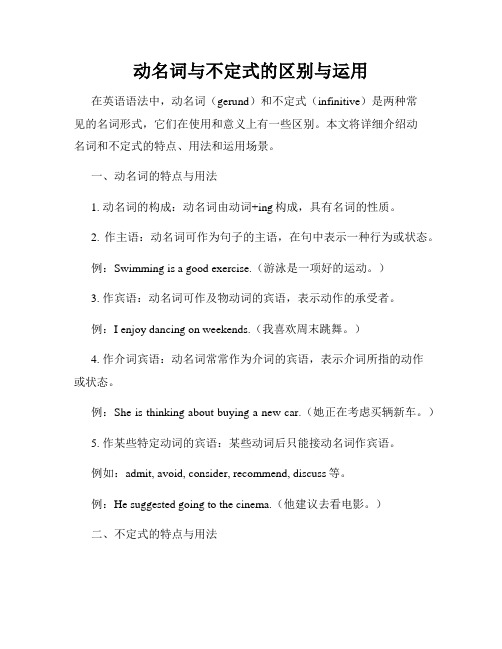
动名词与不定式的区别与运用在英语语法中,动名词(gerund)和不定式(infinitive)是两种常见的名词形式,它们在使用和意义上有一些区别。
本文将详细介绍动名词和不定式的特点、用法和运用场景。
一、动名词的特点与用法1. 动名词的构成:动名词由动词+ing构成,具有名词的性质。
2. 作主语:动名词可作为句子的主语,在句中表示一种行为或状态。
例:Swimming is a good exercise.(游泳是一项好的运动。
)3. 作宾语:动名词可作及物动词的宾语,表示动作的承受者。
例:I enjoy dancing on weekends.(我喜欢周末跳舞。
)4. 作介词宾语:动名词常常作为介词的宾语,表示介词所指的动作或状态。
例:She is thinking about buying a new car.(她正在考虑买辆新车。
)5. 作某些特定动词的宾语:某些动词后只能接动名词作宾语。
例如:admit, avoid, consider, recommend, discuss等。
例:He suggested going to the cinema.(他建议去看电影。
)二、不定式的特点与用法1. 不定式的构成:不定式由to + 动词原形构成,具有名词、形容词或副词的性质。
2. 作主语:不定式可作为句子的主语,常用于表示抽象的概念、信念或理想。
例:To learn a foreign language requires patience and perseverance.(学习一门外语需要耐心和毅力。
)3. 作宾语:不定式可作及物动词的宾语,常与动词一起构成某些固定搭配。
例:She promised to help me with my homework.(她答应帮我做作业。
)4. 作目的状语:不定式可表示动作、状态的目的或用途。
例:I went to the store to buy some groceries.(我去商店买些杂货。
初中英语知识点归纳动词的不定式和动名词用法
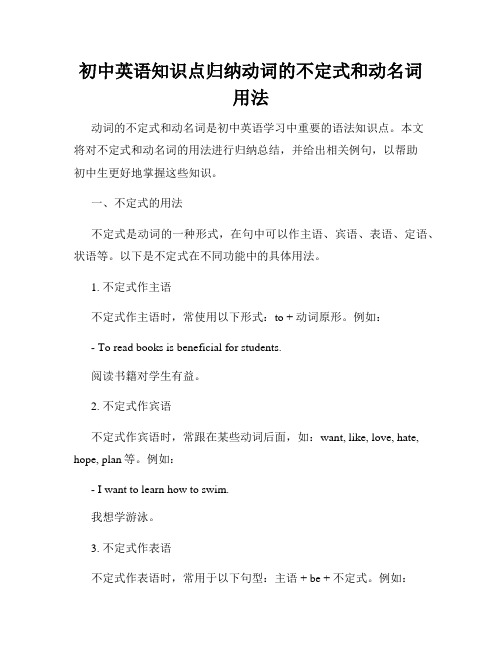
初中英语知识点归纳动词的不定式和动名词用法动词的不定式和动名词是初中英语学习中重要的语法知识点。
本文将对不定式和动名词的用法进行归纳总结,并给出相关例句,以帮助初中生更好地掌握这些知识。
一、不定式的用法不定式是动词的一种形式,在句中可以作主语、宾语、表语、定语、状语等。
以下是不定式在不同功能中的具体用法。
1. 不定式作主语不定式作主语时,常使用以下形式:to + 动词原形。
例如:- To read books is beneficial for students.阅读书籍对学生有益。
2. 不定式作宾语不定式作宾语时,常跟在某些动词后面,如:want, like, love, hate, hope, plan等。
例如:- I want to learn how to swim.我想学游泳。
3. 不定式作表语不定式作表语时,常用于以下句型:主语 + be + 不定式。
例如:- His dream is to become a doctor.他的梦想是成为一名医生。
4. 不定式作定语不定式可以作为名词的定语,放在名词前面修饰名词。
例如:- She has a book to read.她有一本可供阅读的书。
5. 不定式作状语不定式可以作时间、目的、原因、结果、伴随等状语。
例如:- She went to the store to buy some groceries.她去商店购买一些食品杂货。
二、动名词的用法动名词是将动词变为名词形式,以-ing结尾。
动名词可以作主语、宾语、表语、定语和状语等。
以下是动名词在不同功能中的具体用法。
1. 动名词作主语动名词作主语时,可以使用以下句型:动名词 + 动词。
例如:- Swimming is my favorite sport.游泳是我最喜欢的运动。
2. 动名词作宾语动名词可以作动词后面的宾语,也可以作介词后面的宾语。
例如:- I enjoy playing soccer.我喜欢踢足球。
- 1、下载文档前请自行甄别文档内容的完整性,平台不提供额外的编辑、内容补充、找答案等附加服务。
- 2、"仅部分预览"的文档,不可在线预览部分如存在完整性等问题,可反馈申请退款(可完整预览的文档不适用该条件!)。
- 3、如文档侵犯您的权益,请联系客服反馈,我们会尽快为您处理(人工客服工作时间:9:00-18:30)。
及物动词后接动词不定式和动名词作宾语小结(1)2010/09/27 23:03[专四语法 ]及物动词后接动词不定式和动名词作宾语小结动词是英语中最活跃的词性之一,其主要作用是在句中作谓语。
在谓语动词后接动词作宾语时,主要分为两种情况:Ⅰ动词加动词不定式能以不定式做宾语的动词很多,常见的有:want,hope,wonder,wish,agree,try,manager,offer,decide,fail,refuse,ask,pretend,intend,attempt,teach,discuss等。
例如:1.I have learned to drive the car.2.They refused to accept my suggestion.3.He promised to come.Ⅱ动词加动名词在enjoy, appreci ate, admit, consider, mind, avoid., miss, can’t help, deny, practise, allow, finish, imagine, forbid, suggest等这些动词之后要求用动名词作宾语。
例如:1. Have you finished repairing your car?2. She suggested spending another week in the country.3. Do you feel like taking a walk.通常要后接动名词作宾语的动词英语中有些动词后接另一个动词作宾语时,通常要用不定式,不用动名词,这类动词主要admit(承认), advise(建议), allow(允许), appreciate(感激), avoid(避免), consider(考虑), delay(推迟), discuss(讨论), dislike(不喜欢), enjoy(喜爱), escape(逃脱), excuse(原谅), fancy(没想到), finish(完成), forbid(禁止), forgive(原谅), give up(放弃), imagine(想像), keep(保持), mention(提及), mind(介意), miss(没赶上), pardon(原谅), permit(允许), practise(练习), prevent(阻止), put off(推迟), report(报告), resist(忍住), risk(冒险), stop(停止), suggest(建议), understand(理解)等。
如:I admit breaking the window.我承认打破了窗玻璃。
I advise waiting till proper time.我建议等到适当时机。
They avoided mentioning that name.他们避免提到那个名字。
He considered going to see Paul in person.他考虑亲自去找保罗。
They discussed selling the house.他们商量过卖房子的事。
She dislikes doing housework.她不喜欢干家务活。
Would you mind speaking less quickly?你可否讲得慢一点?He forbids smoking during office hours.办公时间他禁止吸烟。
Try to imagine being on the moon.设想你在月球上。
He mentioned seeing her often.他提到过经常见到她。
I c an’t understand treating children like that.那样对待孩子,我不能理解。
引用地址: /Article/201008/1650.html需要我们注意的是,有些动词既可用动词不定式也可用动名词作宾语。
这两种结构在意义上有时差别不大,有时差别较明显。
下面分别说一下这两种情况:Ⅲ这两种情况在意义上差别不大的词有:love, like, hate, prefer, begin, start, continue, need, intend, attempt等。
例如:1. Do you like playing(to play) chess?2. When did you begin learning(to learn) French?随着语言的发展,这些区别也在逐渐缩小,但需要注意的是:在like, love, prefer等动词后,若表示经常性的抽象的动作,多用动名词作宾语;若指特定的或具体的行动,则用不定式更多一些。
例如:1. I lik e swimming, but I don’t like to swimming today.2. She prefers walking to cycling.3. I prefer to stay at home today.在begin, start等词的后面,在下面三种情况下,后接动词不定式较好:✧主语是物而不是人时:Ice begins to melt.✧本身是v-ing形式时: We are starting to clean the classroom.✧其后的动词与想法,感情有关时:I begin to realize that he iswrong.Ⅳ在两种结构在意义上差别较明显的动词有:remember, forget, regret, stop, mean, try等。
例如:1.remember后接动名词通常表示:记得干过某事的,跟动词不定式通常表示:别忘了,要记得干,动作并未发生:●I remembered posting the letter today.我记得今天把信寄走了。
●Please remember to post the letter today.请别忘了今天把信寄走。
2.regret后接动名词,通常表示:对已发生的情况表示后悔,跟不定式通常表示:对将来的情况表示抱歉●I regret to inform you that you won’t be able to attend the class.我们遗憾地通知你们,你们将不能参加这个班。
●I regretted having done such a thing.我后悔做了这样一件事。
3.mean后接动名词,通常表示:意味着,不定式通常表示:打算干什么。
●Failing this exam means waiting for a year.这次考式不通过意味着要等上一年。
●I didn’t mean to argue with you.我不想和你争辩。
4.try后接动名词,通常表示:式一式做某事,跟不定式通常表示:设法去做某事:●Let’s trying doing the work in this way.这项工作咱们这样式式看。
●I’ will work hard, and try to improve.我将努力工作,并设法改进。
及物动词后接动词不定式/动名词作宾语用法小结(2)2010/09/27 23:17[专四语法 ]⒈不定式作宾语①以下动词后,只能跟不定式作宾语。
如:agree,ask,aim,arrange,choose,decide,demand,expect,fail ,help,hope,lean,long,manage,offer,plan,prepare,pretend,promise,refuse,wish等,这些词大部分可接th at引导的从句。
如:I decided to ask for my money back.I decided that I would ask for my money back.When our visit to the farm was over,we expected to startback on foot.When our visit to the farm was over, we expected that wewould startback on foot.②当复合宾语中的宾语是不定式时,先用形式宾语it代替不定式,把不定式置于补语之后,即:主语+动词+it+补语+to do句式。
如:We think it quite important for us to learn a foreignlanguage well.He feels it his duty to help the poor.③介词but,except,besides+to do(do)在这种句型中,如介词前有动词do,后面应接不带to的不定式;如无do,则接to不定式,即带do不带to,带to不带do。
如:The enemy soldiers had no choice but to give in.On Sunday afternoon I had nothing to do but watch TV.⒉动名词作宾语①以下动词后,只能接动名词作宾语,如:admit,appreciate,consider,delay,enjoy,finish,keep,imagine,mind,miss,practise,resist,risk,save,suggest,don't mind,giveup,insist,on, put off等。
如:I suggest spending our summer vacation in a seaside town.You must give up smoking, for it does too much harm toyour health.②动名词作介词的宾语I should go to attend the birthday celebration instead of staying athome.What about inviting Li Jun to make a speech?动名词前的介词有时可以省略,如:have difficulty(in)doing,have no trouble(in)doing,lose no time(in)doing,prevent/stop…(from)doing,there is no use(in)doing等。
⒊部分动词后面,既可接动词不定式,也可接动名词作宾语,意义不变。
如:begin,continue,start,hat e,like,love,need,require,want等。
